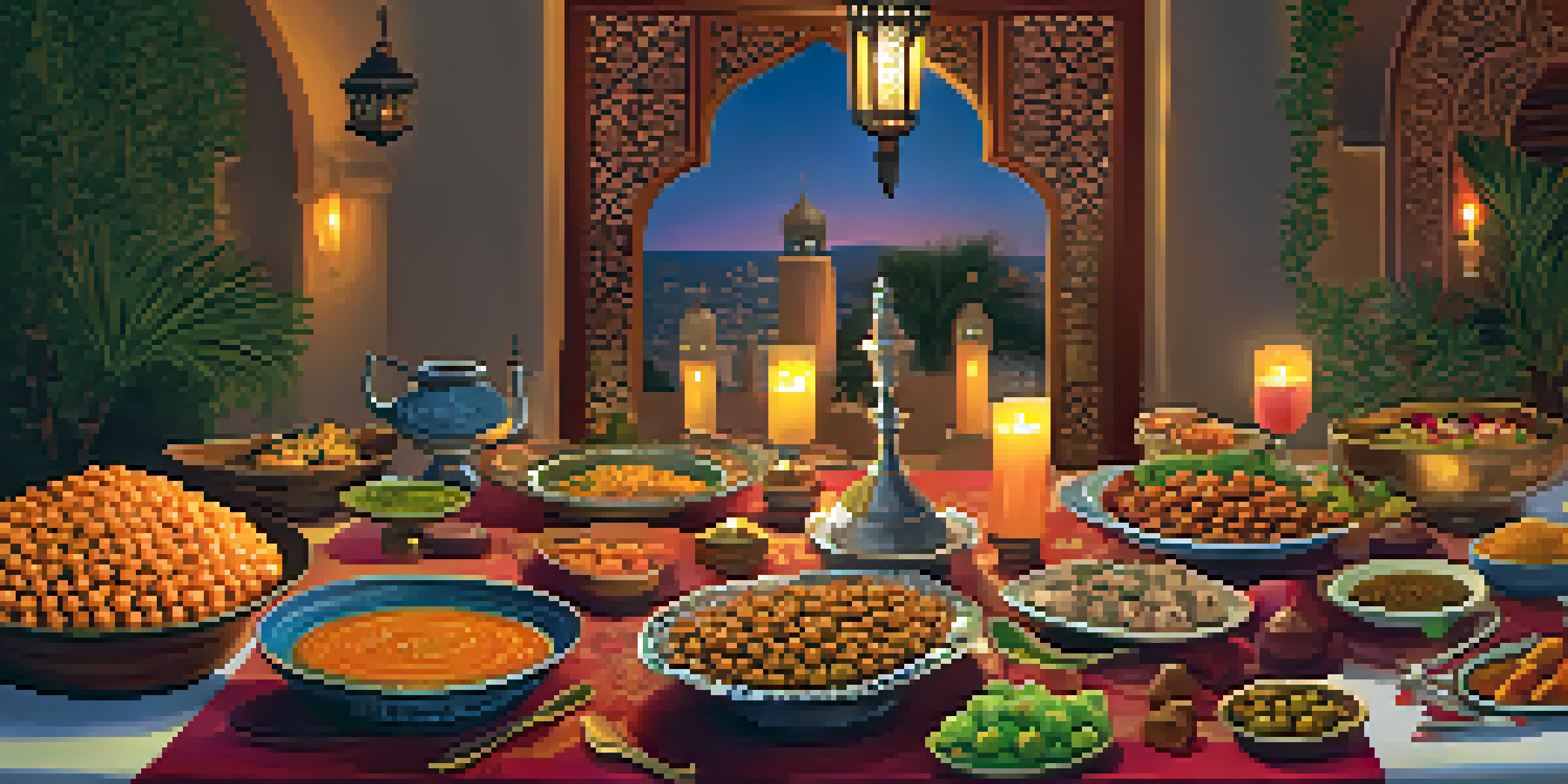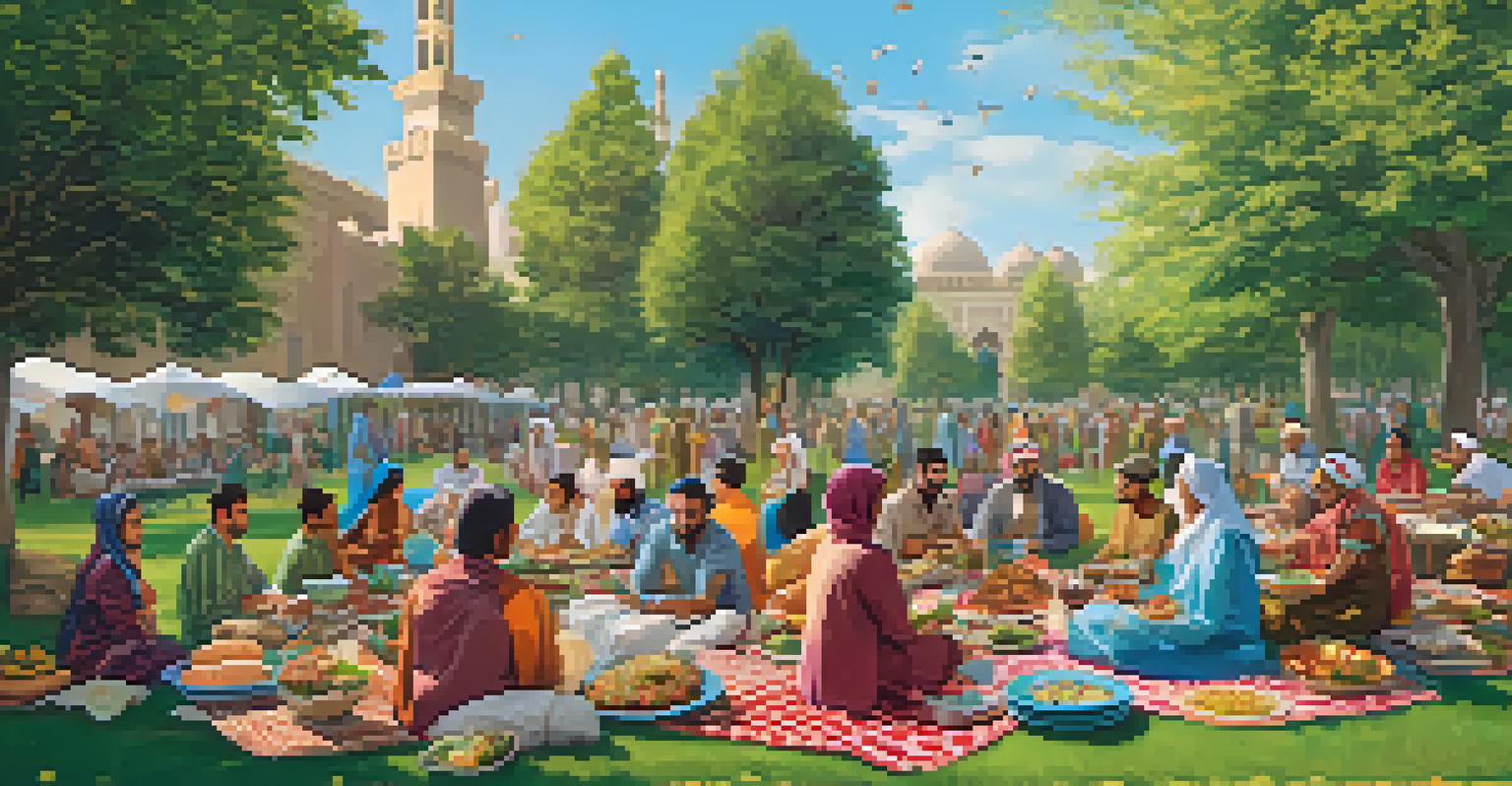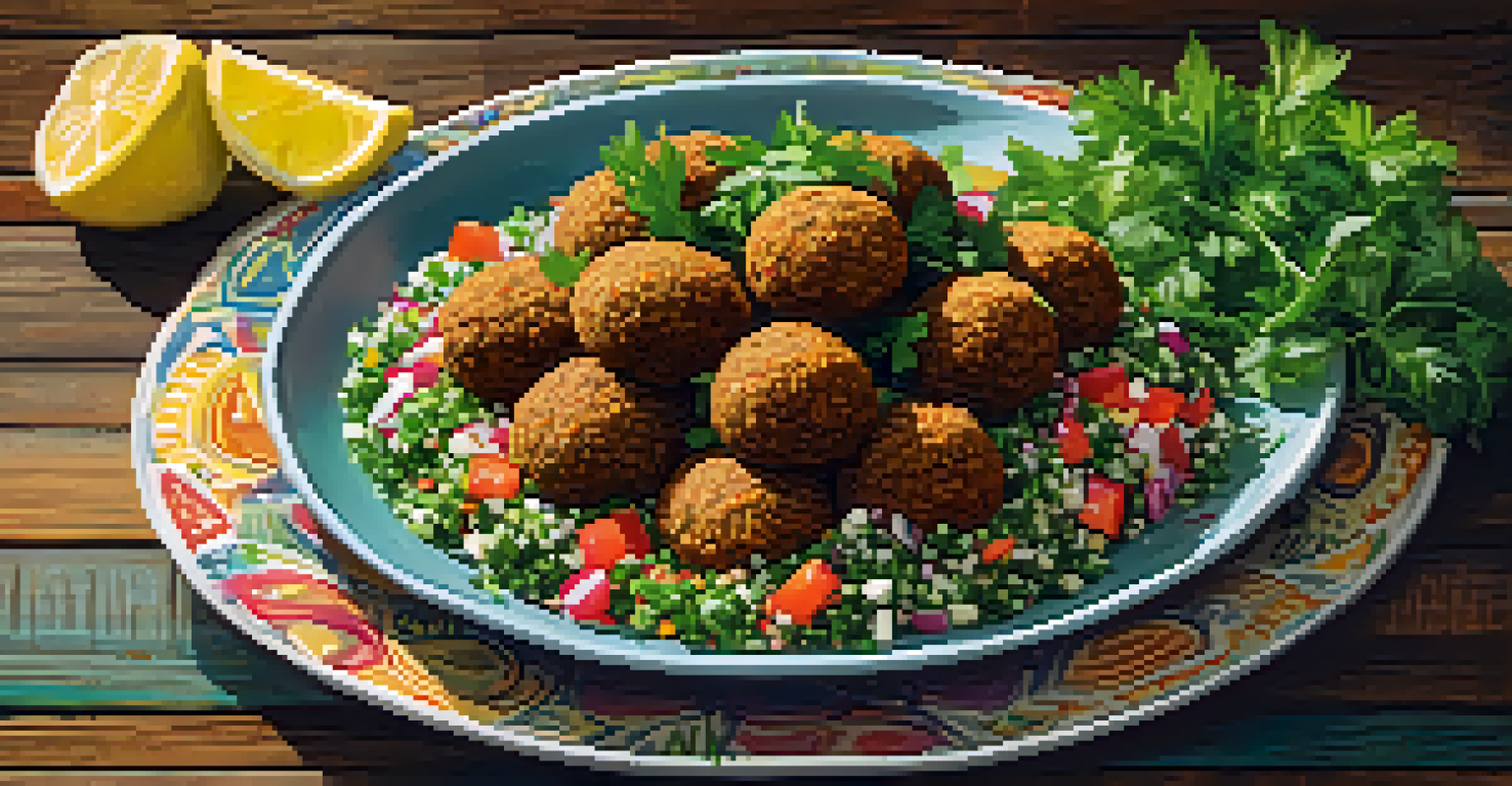Vegetarianism in Ramadan: Cultural Practices and Festivities

Understanding Ramadan: A Time of Reflection and Fasting
Ramadan is a sacred month for Muslims, marked by fasting from dawn until sunset. It's a time for reflection, prayer, and community. While many focus on abstaining from food, the essence of Ramadan goes beyond just the act of fasting; it's about spiritual growth and self-discipline.
Fasting is not about abstaining from food, but about nourishing the soul.
During this month, families gather for iftar, the meal that breaks the fast. This communal experience often includes a variety of dishes, showcasing cultural traditions. For vegetarians, this presents an opportunity to explore plant-based dishes that are both nourishing and celebratory.
The spiritual significance of Ramadan encourages individuals to seek healthier lifestyle choices. For many, adopting vegetarianism during this time aligns with both personal health goals and the values of compassion and sustainability.
The Rise of Vegetarianism During Ramadan Practices
In recent years, there has been a notable increase in vegetarianism among Muslims during Ramadan. Many people are opting for plant-based diets for health, ethical, or environmental reasons. This trend reflects a broader shift towards conscious eating habits, even during a month traditionally associated with rich culinary experiences.

Vegetarian options are not only abundant but also diverse, ranging from lentil soups to stuffed vegetables. These dishes often incorporate spices, herbs, and local ingredients, making them flavorful and satisfying. Sharing these meals during iftar reinforces the communal spirit of Ramadan.
Ramadan Fosters Spiritual Growth
Beyond fasting, Ramadan emphasizes reflection, community, and personal development.
Moreover, the inclusion of vegetarian meals encourages creativity in the kitchen. Many families experiment with new recipes, blending traditional foods with contemporary vegetarian twists, making the iftar table vibrant and inclusive.
Cultural Practices: Regional Vegetarian Dishes in Ramadan
Different regions around the world have their unique vegetarian dishes that come alive during Ramadan. For instance, in South Asia, dishes like chana masala (spiced chickpeas) and samosas filled with vegetables are popular at iftar. These meals not only provide sustenance but also celebrate cultural heritage.
The food you eat can either be the safest and most powerful form of medicine or the slowest form of poison.
In the Middle East, dishes like falafel and tabbouleh are staples on the iftar table, showcasing the richness of plant-based cuisine. These traditional recipes often use fresh ingredients, highlighting the importance of seasonality and locality in food preparation.
Exploring these regional variations not only enriches the Ramadan experience but also promotes cultural exchange. Families may share their favorite recipes with friends, fostering a sense of community and connection through food.
Festivities Surrounding Ramadan: Community and Vegetarianism
Ramadan is a time for community gatherings and festivities, and vegetarianism plays a significant role in these celebrations. Sharing meals with friends and family, especially those who may be vegetarian, fosters inclusivity and understanding. It encourages everyone to partake in the joys of iftar, regardless of dietary preferences.
Local mosques and community centers often host iftar events, where a variety of vegetarian dishes are served. This not only caters to different dietary needs but also emphasizes the spirit of unity and togetherness during the holy month.
Vegetarianism is Rising in Ramadan
An increasing number of Muslims are choosing plant-based diets during Ramadan for health and ethical reasons.
Additionally, special events like potlucks allow individuals to bring their favorite vegetarian dishes, creating a diverse spread that showcases culinary talents and cultural backgrounds. These shared experiences enrich the communal aspect of Ramadan.
Health Benefits of Vegetarianism During Ramadan
Adopting a vegetarian diet during Ramadan can offer numerous health benefits, especially after a day of fasting. Plant-based foods are often rich in essential nutrients, fiber, and antioxidants, which can help rejuvenate the body. This is crucial after a long day without food and water.
Moreover, vegetarian meals can help maintain energy levels throughout the day, making fasting more manageable. Foods like legumes, whole grains, and vegetables provide sustained energy, helping to avoid the fatigue that can sometimes accompany fasting.
Incorporating vegetarian dishes also promotes hydration, which is vital during Ramadan. Many plant-based foods have high water content, helping to replenish fluids lost during the day. This balance is essential for overall well-being during the month of fasting.
Vegetarianism and Sustainability: A Ramadan Perspective
As conversations around sustainability grow, many are looking to their diets as a way to make a difference. Vegetarianism during Ramadan can be seen as an opportunity to embrace more sustainable food choices. By opting for plant-based meals, individuals can reduce their carbon footprint and promote environmental consciousness.
The global food system has significant environmental impacts, and Ramadan provides a chance to reflect on these choices. Many traditional Ramadan dishes can be made with locally sourced ingredients, minimizing transportation emissions and supporting local economies.
Cultural Diversity Enriches Ramadan
Different regions celebrate Ramadan with unique vegetarian dishes that highlight cultural heritage and foster community.
This mindful approach to eating aligns with the values of compassion and stewardship emphasized during Ramadan. By choosing vegetarian options, families can contribute to a more sustainable future while still enjoying the rich traditions of their culture.
Celebrating Diversity: Vegetarianism in Global Ramadan Traditions
Ramadan is celebrated around the world, and each culture brings its unique flavors and practices to the table. In some regions, vegetarianism is deeply rooted in spiritual practices, influencing how meals are prepared and shared. This diversity enriches the Ramadan experience for everyone involved.
For instance, in Indonesia, many families embrace vegetarian dishes during Ramadan as a form of devotion. The local cuisine includes a variety of plant-based options that reflect cultural heritage and spiritual significance. This practice highlights how vegetarianism can be woven into the fabric of Ramadan celebrations.

By recognizing and celebrating these global traditions, we can appreciate the beauty of diversity in our shared experiences. It encourages dialogue and understanding between different cultures, fostering a sense of unity during this holy month.